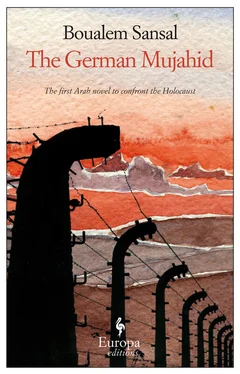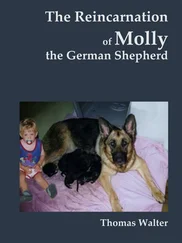As we came into Sétif, the sun, now sinking in the west, still hammered down like a hydraulic press at noon. “You see, m’sieur,” Omar got out his best smile: “No problem.” “Yeah,” I said, “I’m wondering why it cost me so much money. For what I paid the least I’d expect is a couple of murders, a sunset doesn’t really cut it.”
This didn’t sound like the Rachel I knew. Round me, he always seemed so serious, so distant and withdrawn, and he was always acting the big brother — I hated that. Rachel never really fitted in on the estate, with his Swedish good looks and his la-di-dah politeness, his university degree, his big-shot job at a multinational corporation, his little house and his little garden in a posh neighbourhood. The estate doesn’t approve of individual success: it breeds jealousy, it rocks the boat, it stirs up a shitload of aggravation. To tell the truth, I was ashamed of him. Everyone on the estate assumed I was loaded. They were always saying, “Why don’t you go ask you brother?” He should have moved away, gone to live in Paris. I never understood why he stuck around. To make things worse, Ophélie was the sexiest thing on the estate. All the kids on the estate called her Bump — short for ‘speed bump’ because everyone slowed down when she walked past — that’s how hot she was. After she and Rachel got married, I put the word out: first person calls her Bump is a dead man. After that the guys on the estate called her Rachella. They’d grown up a bit by then, they knew the score, and there were plenty more fish in the sea.
In his diary, Rachel sounds cool, funny, he sounds human. I thought maybe misery made him humble, human, but now I’m not so sure. Everyone on the estate is miserable as sin, but they’re not humble and there aren’t many like uncle Ali and aunt Sakina who are genuine human beings. Maybe having to question everything is what did it, all the questions he asks himself in his diary. But I think there’s something else, I think deciding to go back to Aïn Deb, in spite of the risks and the consequences, was a weight off his shoulders. People say there’s a real satisfaction in doing your duty.
Rachel doesn’t say what he did in Sétif or how he got to Aïn Deb. I suppose he haggled with a local cab driver and got some all-inclusive deal that covered whatever danger there was out there in the bled . Rachel never was much of a talker, but he obviously found people to talk to in Algeria. My mate Momo — his parents are from the province of Kabylia too — says they’ve got pretty much everything in Sétif: houses and streets and cafés and garages and all that shit. And there’s this famous fountain in the middle on the Place de la Fontaine. Momo swears it’s the most beautiful place in the world. He says all the men in Sétif are truck drivers or taxi drivers, they’re like the cowboys you see in movies who never get off their horses, Momo says they’re proud of it, that being a driver is something passed down from father to son for generations, he says that, to them, dying behind the wheel is a glory they all dream about. I’m just telling it like I heard it. I suppose it takes all kinds.
Rachel arrived in Aïn Deb at about 3 P.M. He wrote:
My God, to think I was born here, miles from anything! You won’t find Aïn Deb—“The Donkey’s Well”—on any map, you’re not even likely to stumble on it by accident. There’s no reason in the world for anyone to come here. Even someone lost, someone on the run, wouldn’t stay here, having more reason than most to keep moving, they’d be out of here as fast as they could. You turn off the tarmac road a couple of miles outside Sétif and drive along dirt tracks through a bare, rugged, silent wasteland ringed by infinite horizons. You immediately start to feel uneasy, you feel small, forlorn, damned. Much of the time, there is no line dividing earth and sky and everywhere you look is empty, ochre. We drive on towards an infinite, shifting wall of sand, and I feel obsessed by the idea that the map is closing up behind us. In mathematical terms, I’d say that by some quantum shift we seem to have entered non-Euclidean space; there are no signs, no landmarks here that a human being can relate to, there is no sense of time, no possible human compassion, nothing but an insistent drone like the echo of some cataclysm from before the flood. Exhausted from the heat, I start to wonder what terrible danger early man must have been running from to hole up in a place like this. Why did succeeding generations stay here? What enchantment kept them fettered to this place? It seems appalling, but for a minute it even occurred to me that the massacre of April 24 was simply in the nature of things. This landscape is meant be barren, it tolerates man only until it can find some way of being rid of him. But this is where I was born, where I grew up. I played here as a child. I must have loved this place, at that age you’re curious about everything, or at least you turn boredom into dreams and take your pleasure in them. If I left, it was because papa decided I should, thereby preempting the judgment of the earth and of Allah’s madmen who, in the wasteland of their minds, would come up with the idea of obliterating every trace of life twenty-five years later.
Aïn Deb is wedged at the bottom of a steep valley between four desolate hills. The people who first settled here were clearly trying to hide from the world. Maybe it goes back to ancient times, to tribes exhausted by blood feuds when the weakest hid away, settled out of sight to avoid the constant raids. Or maybe this place was once lush and verdant, capable of sustaining life, perhaps this barren wasteland came later, the result of some great catastrophe, some curse, some strange disease, some nameless mystery. Maybe drought followed hard on its heels like a tornado whipping away the last illusions of those who lived here. Their children would have left for other lands, other skies, taking with them a cruel, bitter memory which, like a self-fulfilling prophecy, doomed them to search in vain to know why they were cursed, while exhaustion, fear and the need to atone ensured they would never feel at peace in their new life. To those who run away, even the idea of a safe haven is dangerous, they see it as a trap where they will be forced to stop running. By some miracle Aïn Deb survived, it had a wellspring and it refused to give up life. And wherever a miracle is born, there is always some fearless donkey to bear witness. It’s astonishing how little people know about the history of their country. I wonder how many people in the world are capable of recounting the history of their village, their neighbourhood, even their house without slipping into some convenient fantasy. Fewer still know the history of their own family. And though I didn’t know it yet, the mad, nightmarish history of my family was about to blow up in my face and kill me.
I stopped on the crest of a hill. I didn’t have the strength to go any further, I felt sick, my eyes were stinging, sweat ripped at my back. Death hung in the air, I could smell it. And yet I could sense some residual force that spoke of life and of eternity. My heart was beating fit to burst, beating out a rhythm to a lament that sprang from the depths of the earth, from the pulsing sun, from the anguished cries of a memory imprisoned in stone. Here, amid this savage beauty, this agony of stone, this harsh light, life and death merged. The question whether to live or to die was superfluous; here opposites converged, here time was as it always was: an infinite silence, a crippling stillness, light rose and fell, the seasons chased each other like brothers and sisters, speaking to nothing but the immutable phases of the solar cycle. I sat on a rock, mopping my face with a handkerchief, and like an old man returning to a forgotten country, memories stirred, images appeared. They were quickly whipped away by what I saw. My memories did not tally with the reality. I dimly remembered a large, immaculate, contented village perched on a hill, and greedy tentacles spilling down, eating into the hillside; what I saw, devastating in its truth, was a pitifully small village which looked as though it vainly struggled to set its roots into the upper slopes. Everything here was hemmed in by steep hills. Two or three houses, rising up to defy the heavens, stood, unfinished, left to wrack and ruin. There was water in the wadi , and warty toads, the sort we used to torment during the mating season when we were kids, now there was also a small pool on a bed of powdery rock ringed by deadwood polished by time. In my mind, I remembered a breathtaking forest, but what I saw before me was a dying copse. In my mind, the streets hummed with life, and now, shielding my eyes to look down, all I could see were deserted laneways, cracked, crumbling walls, a flea-bitten mongrel wandering, a lone chicken scavenging, a donkey staring out and. . there, yes. . there in the courtyard, on the terrace, in the shadow of the mosque, people, women, children! I leapt to my feet and bounded down the hill like a mountain goat.
Читать дальше












